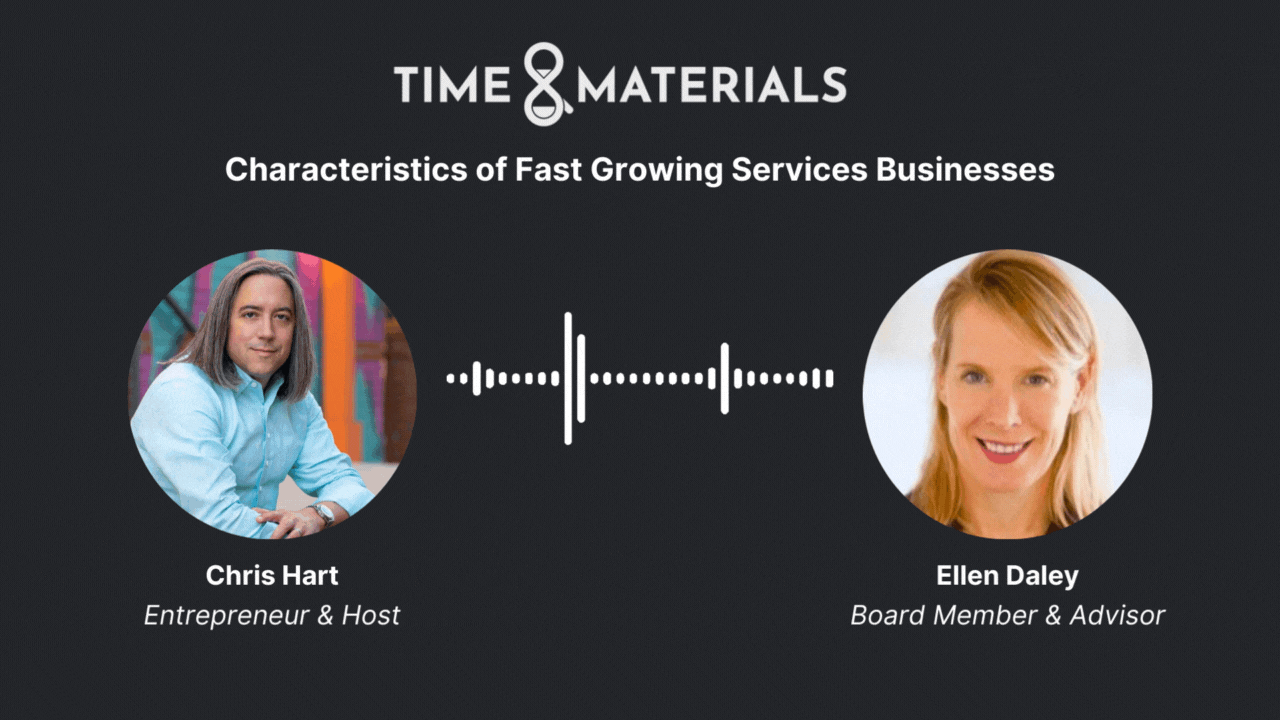I recently caught up with Ellen Daley, an experienced board member and advisor for professional services firms.
Ellen was the CEO of Acorio, a ServiceNow consultancy that became ServiceNow’s largest boutique partner. Along the way, Acorio was recognized on Inc’s Best Workplaces list and had one of the highest customer satisfaction scores in the ServiceNow ecosystem. Acorio was sold to NTT Data in October 2020.
Today’s podcast episode is the first part of our conversation that focuses on the characteristics of fast-growing professional services companies. Part two of our conversation will be posted next week, discussing partner-led sales approaches. Subscribe below so you’d miss it.
Ellen and I covered a lot of ground in this episode. Here’s a summary of some of the high points in our conversation:
Professional background and traits for services company leadership
A willingness to be analytical & data-oriented. Managing the business using objective, quantitative measures is essential, especially in fast-growing businesses. Identifying the key metrics that matter, particularly regarding financial performance, is essential.
Recognition that running a P&L is different than running a company. Running a P&L is challenging and requires skill, but running a company’s finances introduces entirely different problems to solve. For example, most early-stage, fast-growing companies often encounter cash flow challenges, which large company P&L leaders seldom have to worry about.
A background with roles that teach the value of creating, selling, and delivering premium services. The perception and reality of “premium” often come from more than just the technology being delivered - it is the combination of people, delivery processes, and operational excellence.
Possessing the ability to dial down the desire for process so it’s size appropriate for the business. Working for large companies often involves lots of processes. Early-stage, fast-growing businesses need less process than big companies, but that doesn’t mean no process.
What makes fast-growing businesses different
Fast-growing businesses require a different mindset and a different decision-making approach. One example of common day-to-day decision-making that enables fast growth is how aggressively new staff members are hired. A more conservative approach, i.e., only hiring when new work is signed, can lead to slower growth.
Revenue growth typically determines whether a business is “fast-growing.” Growth rates that qualify as fast-growing on a percentage basis usually get smaller as the absolute numbers get bigger. For example:
Growth rates in <$70M annual revenue businesses change rapidly. Very early-stage companies can grow at 50-100% or more, but growth rates typically decelerate into the 30-50% range.
In a $70-100M annual revenue business, 30+% yearly revenue growth is fast
At >$100M in annual revenue, >20% yearly growth is fast
Focus on sales with a rigorous go-to-market approach and investment aimed at sales & marketing. Slower-growing businesses can get away with less sales and marketing investment and higher profits, but a scalable sales and marketing function is necessary to sustain fast growth.
The evolution of sales in fast-growing businesses
Don’t hire sales teams too quickly at first. These investments eat cash, and you may not be ready for it.
Start with a strong sales leader who can also be an active salesperson. The ideal hire is someone capable of running sales efforts independently but can also begin hiring and running a successful sales team.
It’s hard to predict success with salespeople in high-growth environments. Many early-stage companies have a high rate of failures, i.e., 50% or more of initial sales hires not working out.
A salesperson with a track record of success in a combination of big companies and startups is a good indicator. However, past success doesn’t guarantee future success.
Salespeople can be successful in some companies and fail in others. Someone who fails spectacularly in a role at an early-stage company can still go on to be wildly successful at another company. Sales success is very context-dependent.
Investment in marketing is essential for both sales and talent/recruiting. Fast-growing companies need to be able to hire quickly, and creating brand awareness helps attract new talent.
Managing the balance between revenue growth and profitability
Running at break-even is very risky. It is a strategy some businesses pursue, but Ellen (and I!) don’t recommend it. It leaves minimal margin for error, and running out of cash in the current macroeconomic environment can easily be fatal to the business.
Growing a $10-30M business growing mid-20s to 30% annually with low double-digit EBITDA is healthy.
Building a fast-growing business should also mean being a great place to work and making a significant impact for clients. Maintaining a minimum level of profitability is an excellent forcing function.
Healthy gross margin and project margins
Healthy project margins when selling consultative, project-based work are 55-60%.
High growth, as described above, requires investment for delivery management. Aggregate gross margins in the 37-45% range are a good target.
Managed services are an excellent way to lift overall margin. These services are like “annuities” for revenue, meaning they are frequently renewed.
Target larger deals even if they are fewer in number. Sometimes services companies will believe selling dozens of small engagements is easier and think they can fool themselves into believing they are high margin. In reality, some overhead comes from any engagement, and selling fewer, large engagements is often a better recipe for a high aggregate gross margin.
Funding fast growth
Lines of credit can be hard to come by. It took Ellen 9 banks! However, lines of credit can be beneficial to fund growth and are worth spending the time to get.
Selling equity in early-stage companies to raise capital is an option. However, few investors are interested in that stage (too early for PE) of services companies, so finding that sort of investment can be challenging. Founders risk losing control of their company, so it’s essential to know and trust any investors being considered.
Professional investors often can’t help operationally. However, professional investors often provide sound corporate governance, which can be helpful. Independent board members playing an advisory role fill the gap of operational expertise that professional investors often lack.
Keys to success when setting out to build a fast-growing business
Pick a strategy and stick with it long enough to test if it works. It can take 12-18 months to see traction. Leadership shouldn’t be so married to a strategy that it drives the business into the ground. However, it can take time to see strategies pay off, so leadership should be prepared to stay the course and know what progress should look like.
Identify a differentiated service offering. Build a narrative around that differentiation that demonstrates the value the company provides.
Strategy has to identify a specific market, i.e., industry + client size + geography.
Don’t pick too many partners. Also, know that partners never give leads for free - be prepared to do work for leads and sales.
Have a cadence to releasing and promoting thought leadership targeted at multiple buyers in target companies. This is needed support for the sales team.
✌🏼 That’s it for this week, but there’s still another half of the conversation! Next week’s episode will pick up where this one leaves off to cover partner-centric sales approaches in more detail. Subscribe below so you don’t miss it.






